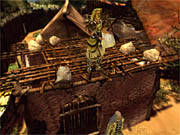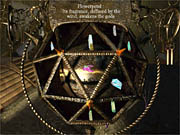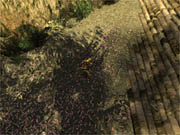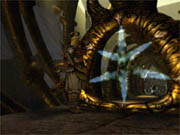You'd be hard-pressed to find a better source of material for an adventure game than stories in Greek mythology. Powerful gods, bizarre monsters, exotic lands, gripping tales of famous heroes--what more could a game developer want for inspiration? And of all the famous Greek myths, probably none manage to cram in as much action and intrigue as Homer's The Odyssey, the epic poem that chronicles the numerous trials that Ulysses must overcome as he seeks to return home to Ithaca after the Trojan War. Odyssey: The Search for Ulysses has an interesting perspective on these events. While its puzzles aren't very complicated and while it has some technical problems, it still proves to be an enjoyable adventure because of its story and its characters.

As the name implies, Odyssey: The Search for Ulysses doesn't focus on the perilous journey of the scheming hero. You instead play as Heriseus, an inhabitant of Ulysses' homeland, who doesn't seem to be prime hero material: He killed an innocent man while he was drunk on Ithacan wine, which led to his banishment by Ulysses. During his exile, the Trojan War erupted, and as the 10-year-long conflict raged, Heriseus met and married a woman named Alimir. But Heriseus is truly a hard-luck guy--both Alimir and the couple's unborn daughter die from disease. When Heriseus finally makes his way back to Ithaca, he's approached by Ulysses' wife, Penelope. Hounded by suitors who insist Ulysses must be dead by now and that she should remarry, Penelope gives Heriseus the seemingly impossible task of tracking down Ulysses and bringing him back before the situation becomes critical.

All this isn't revealed at the beginning of the game--the only things you're certain of initially is that your character has returned from banishment and that he's got to find his old friend and king. As the game progresses, you uncover bits and pieces of Heriseus' past, until finally the whole story is revealed when you make a journey to a particular place that definitely wouldn't make for a good vacation spot. Because Heriseus has to follow his master's trail, you'll visit several of the locations Ulysses explored: After leaving Troy, you'll make your way to the island of the lotus eaters, battle a couple of angry (and hungry) Cyclopes, journey to the island of the man-eating Laestrygonians, and fall under the witchery of Circe.
The graphics in Odyssey are inconsistent: One second, you might be admiring the rich, lifelike details of a building or landscape, and the next you'll be wondering why the ocean looks like a bad painting from a cheap motel. All the characters are modeled in 3D, and while they're a bit blocky, their animation is fairly good. But you'll still notice some problems, like how Heriseus' neck and head never move no matter what he does.
There aren't that many environmental puzzles or strange gadgets to stump you in Odyssey. The gameplay mostly consists of your having to collect inventory items and engage in conversations with other characters for clues and information. Rarely will you find yourself at an impasse in which you have no idea what to do next, except perhaps at the very start of the game: An omission in the manual makes it unclear how you're supposed to manipulate an inventory item with something else. And though the inventory interface is certainly unique in appearance, it's definitely not a good example of form following function. Items are stored in what looks like a geodesic dome--by using the arrow keys, you cycle through objects you're carrying until the one you want to use is in the center. This works fine most of the time, but, early in the game, your inventory gets loaded down with about a dozen items, and spinning through all of them to find the one you need is tedious. Fortunately, the number of items you'll usually be carrying at any given time is significantly lower once you leave Troy.

Though the solutions to most of the puzzles are sometimes complex, they're are at least fairly logical--save for two. One demands you to give an incorrect answer to a "trivia question" posed to Heriseus (seemingly the result of a mistranslation from French to English), while another requires you to use four items in a specific order that's inconsistent with the instructions Heriseus is given by Circe. Besides these, the biggest obstacle in Odyssey may be having to master simply moving around in the game: As the third-person perspective changes to track your character through various scenes, you can sometimes find yourself staring at the top of Heriseus' head. Keeping track of where you are and where you've already been is made difficult by the shifting perspective. But once you get the hang of it, the only real problem will be figuring out how to avoid a patrol of hungry Laestrygonians and working your way through a frustrating maze late in the game.
Odyssey: The Search for Ulysses has a few other relatively minor flaws. Death can come with no warning, because while Heriseus is nimble enough to prance along the edges of cliffs without fear of falling, he's a real sucker for dropping down strategically placed holes or drowning in water. A quick-save feature would have considerably lessened the frustration factor of these inevitabilities--instead, you've got to exit out to the options screen for saves and loads. Also, a few of the puzzle solutions change randomly with each attempt; while none of the puzzles like this are especially difficult, you might not like having to rethink them if you're forced to play through a sequence multiple times. 
The game would have been easier to play if it let Heriseus examine objects and environments. As it is, you really don't know what you're about to pick up, activate, or even break until the deed's done. And the inability to combine inventory objects for creating new devices limits the puzzle design. Only once do you have to use two inventory items to make a new one, and to do it, you must drop one item to the ground and then repeat the process with the other.
In spite of these shortcomings, Odyssey remains an enjoyable game, because the story and characters are engaging enough to hold your attention until the conclusion. Though its problems might be frustrating at first, once you settle into the game, you'll be in for a suitably rewarding adventure.